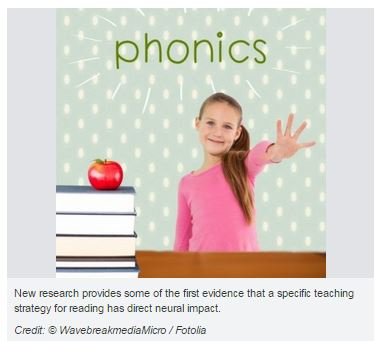Brain Waves Show How Different Teaching Methods Affect Reading Development
[Source: Science Daily]

Beginning readers who focus on letter-sound relationships, or phonics, instead of trying to learn whole words, increase activity in the area of their brains best wired for reading, according to new Stanford research investigating how the brain responds to different types of reading instruction.
In other words, to develop reading skills, teaching students to sound out “C-A-T” sparks more optimal brain circuitry than instructing them to memorize the word “cat.” And, the study found, these teaching-induced differences show up even on future encounters with the word.
The study, co-authored by Stanford Professor Bruce McCandliss of the Graduate School of Education and the Stanford Neuroscience Institute, provides some of the first evidence that a specific teaching strategy for reading has direct neural impact. The research could eventually lead to better-designed interventions to help struggling readers.
“This research is exciting because it takes cognitive neuroscience and connects it to questions that have deep meaning and history in educational research,” said McCandliss, who wrote the study with Yuliya Yoncheva, a researcher at New York University, and Jessica Wise, a graduate student at the University of Texas at Austin.
Read the Rest of this Article on Science Daily
The study, co-authored by Stanford Professor Bruce McCandliss of the Graduate School of Education and the Stanford Neuroscience Institute, provides some of the first evidence that a specific teaching strategy for reading has direct neural impact. The research could eventually lead to better-designed interventions to help struggling readers.
“This research is exciting because it takes cognitive neuroscience and connects it to questions that have deep meaning and history in educational research,” said McCandliss, who wrote the study with Yuliya Yoncheva, a researcher at New York University, and Jessica Wise, a graduate student at the University of Texas at Austin.
Read the Rest of this Article on Science Daily
PediaStaff is Hiring!
All JobsPediaStaff hires pediatric and school-based professionals nationwide for contract assignments of 2 to 12 months. We also help clinics, hospitals, schools, and home health agencies to find and hire these professionals directly. We work with Speech-Language Pathologists, Occupational and Physical Therapists, School Psychologists, and others in pediatric therapy and education.
